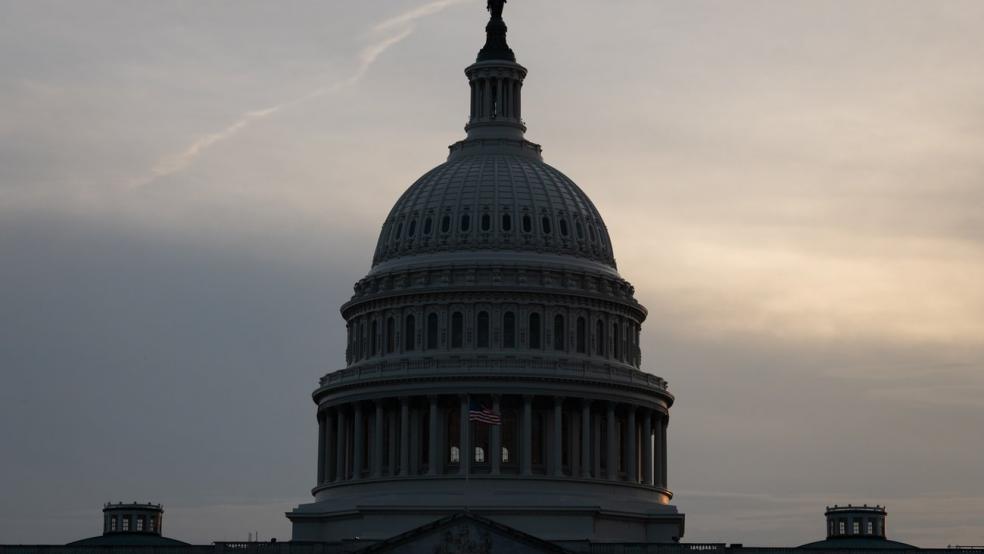Senate Majority Leader Chuck Schumer is aiming to hold a vote next week on a $106 billion aid package for Ukraine, Israel and Taiwan, but that plan depends on whether lawmakers can forge an agreement on tougher border security measures — a contentious and divisive issue on which previous legislative efforts have failed.
“I called the president last week to make sure he understood that there wouldn't be a bill without a credible effort to get on top of our disastrous southern border situation,” Senate Minority Leader Mitch McConnell told reporters Tuesday.
As Senate Republicans and Democrats race to hash out a deal, they have reportedly found room for compromise in some areas — but have also run into trouble on other points.
“While bipartisan talks have made progress on tightening the initial screening process for migrants seeking asylum—a central demand of Republicans—a separate policy known as humanitarian parole has now emerged as a sticking point in negotiations,” The Wall Street Journal’s Lindsay Wise and Michelle Hackman report. Humanitarian parole, they explain, allows the president to temporarily let immigrants into the country who don’t otherwise qualify for a visa.
Democrats are insisting they will not adopt all the elements of a border bill passed earlier this year by House Republicans. “We’re not going to pass H.R. 2,” Democratic Sen. Chris Murphy of Connecticut said, according to the Journal.
As negotiations proceed, some conservatives are pushing for essentially that. Heritage Action for America, a right-wing advocacy group, came out Tuesday against any Senate plan that “removes key provisions” from the House plan.
“In June, all present Senate Republicans except one voted for H.R. 2, but now, a group of senators is undermining Republican unity and effective policy solutions by negotiating with Democrats who support open border policy,” Heritage Action President Kevin Roberts said in a statement. “Worse, the proposal coming out of these ‘negotiations’ will likely be used as leverage to advance President Biden’s request for $106 billion in fiscally irresponsible spending, including an additional $60 billion for Ukraine that fails to meet conservative standards and $13.6 billion for fake ‘border security’ that would accelerate Biden’s open border operations. House and Senate conservatives should reject this proposal and commit to supporting H.R. 2 to restore safety and security for the American people. Anything less is unacceptable.”
The House plan calls for continued construction of former president Donald Trump’s border barriers and the resumption of a Trump-era policy requiring migrants seeking asylum to “remain in Mexico” up until their court date. It would also place stricter limits on asylum eligibility. The White House in May threatened to veto the House plan, which it said does nothing to address the root causes of migration and instead limits legal pathways to entry and reduces humanitarian protections “in ways that are inconsistent with our Nation’s values and international obligations.”
Read more about the asylum and humanitarian parole issues here or here.
What’s not on the agenda this week: As negotiations continue to enable a vote on the foreign aid package, The Hill notes that no government funding bills are slated for consideration on the House floor this week —“an ominous sign for Republicans returning to Washington for the first time since their Thanksgiving recess.”
Conservatives have been pushing for the House to pass 12 individual annual appropriations bills in hopes of securing more leverage to force spending cuts in negotiations with the Democratic-led Senate, which has marked up its spending bills at higher levels than the House. But House Republicans have struggled to overcome intraparty divisions on a handful or those funding bills.
“Losing an entire week without passing an appropriations bill won’t lead to a shutdown. But it doesn’t help either,” The Hill’s Emily Brooks, Mike Lillis and Mychael Schnell write. “The initial schedule amounts to an admission from Republican leaders that the slim majority is stuck on how to handle its remaining appropriations measures.”





